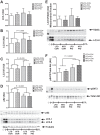Long-term rates of mitochondrial protein synthesis are increased in mouse skeletal muscle with high-fat feeding regardless of insulin-sensitizing treatment
- PMID: 28698283
- PMCID: PMC5792140
- DOI: 10.1152/ajpendo.00144.2017
Long-term rates of mitochondrial protein synthesis are increased in mouse skeletal muscle with high-fat feeding regardless of insulin-sensitizing treatment
Abstract
Skeletal muscle mitochondrial protein synthesis is regulated in part by insulin. The development of insulin resistance with diet-induced obesity may therefore contribute to impairments to protein synthesis and decreased mitochondrial respiration. Yet the impact of diet-induced obesity and insulin resistance on mitochondrial energetics is controversial, with reports varying from decreases to increases in mitochondrial respiration. We investigated the impact of changes in insulin sensitivity on long-term rates of mitochondrial protein synthesis as a mechanism for changes to mitochondrial respiration in skeletal muscle. Insulin resistance was induced in C57BL/6J mice using 4 wk of a high-fat compared with a low-fat diet. For 8 additional weeks, diets were enriched with pioglitazone to restore insulin sensitivity compared with nonenriched control low-fat or high-fat diets. Skeletal muscle mitochondrial protein synthesis was measured using deuterium oxide labeling during weeks 10-12 High-resolution respirometry was performed using palmitoyl-l-carnitine, glutamate+malate, and glutamate+malate+succinate as substrates for mitochondria isolated from quadriceps. Mitochondrial protein synthesis and palmitoyl- l-carnitine oxidation were increased in mice consuming a high-fat diet, regardless of differences in insulin sensitivity with pioglitazone treatment. There was no effect of diet or pioglitazone treatment on ADP-stimulated respiration or H2O2 emission using glutamate+malate or glutamate+malate+succinate. The results demonstrate no impairments to mitochondrial protein synthesis or respiration following induction of insulin resistance. Instead, mitochondrial protein synthesis was increased with a high-fat diet and may contribute to remodeling of the mitochondria to increase lipid oxidation capacity. Mitochondrial adaptations with a high-fat diet appear driven by nutrient availability, not intrinsic defects that contribute to insulin resistance.
Keywords: deuterium oxide; mitochondria; protein turnover; respiration; tracer.
Copyright © 2017 the American Physiological Society.
Conflict of interest statement
No conflicts of interest, financial or otherwise, are declared by the authors.
Figures






Similar articles
-
Decrement in resting and insulin-stimulated soleus muscle mitochondrial respiration is an early event in diet-induced obesity in mice.Exp Physiol. 2019 Mar;104(3):306-321. doi: 10.1113/EP087317. Epub 2019 Jan 24. Exp Physiol. 2019. PMID: 30578638
-
Remodeling of skeletal muscle mitochondrial proteome with high-fat diet involves greater changes to β-oxidation than electron transfer proteins in mice.Am J Physiol Endocrinol Metab. 2018 Oct 1;315(4):E425-E434. doi: 10.1152/ajpendo.00051.2018. Epub 2018 May 29. Am J Physiol Endocrinol Metab. 2018. PMID: 29812987 Free PMC article.
-
Carnitine supplementation in high-fat diet-fed rats does not ameliorate lipid-induced skeletal muscle mitochondrial dysfunction in vivo.Am J Physiol Endocrinol Metab. 2015 Oct 1;309(7):E670-8. doi: 10.1152/ajpendo.00144.2015. Epub 2015 Aug 18. Am J Physiol Endocrinol Metab. 2015. PMID: 26286868
-
Skeletal Muscle Nucleo-Mitochondrial Crosstalk in Obesity and Type 2 Diabetes.Int J Mol Sci. 2017 Apr 14;18(4):831. doi: 10.3390/ijms18040831. Int J Mol Sci. 2017. PMID: 28420087 Free PMC article. Review.
-
Cytosolic lipid excess-induced mitochondrial dysfunction is the cause or effect of high fat diet-induced skeletal muscle insulin resistance: a molecular insight.Mol Biol Rep. 2019 Feb;46(1):957-963. doi: 10.1007/s11033-018-4551-7. Epub 2018 Dec 8. Mol Biol Rep. 2019. PMID: 30535784 Review.
Cited by
-
17α-Estradiol alleviates high-fat diet-induced inflammatory and metabolic dysfunction in skeletal muscle of male and female mice.Am J Physiol Endocrinol Metab. 2024 Mar 1;326(3):E226-E244. doi: 10.1152/ajpendo.00215.2023. Epub 2024 Jan 10. Am J Physiol Endocrinol Metab. 2024. PMID: 38197793 Free PMC article.
-
Dietary delivery of glycomacropeptide within the whey protein matrix is not effective in mitigating tissue ceramide deposition and obesity in mice fed a high-fat diet.J Dairy Sci. 2024 Feb;107(2):669-682. doi: 10.3168/jds.2023-23914. Epub 2023 Sep 13. J Dairy Sci. 2024. PMID: 37709040 Free PMC article.
-
Mitochondrial adaptations to exercise do not require Bcl2-mediated autophagy but occur with BNIP3/Parkin activation.FASEB J. 2020 Mar;34(3):4602-4618. doi: 10.1096/fj.201902594RR. Epub 2020 Feb 6. FASEB J. 2020. PMID: 32030805 Free PMC article.
-
Diet and Exercise Training Influence Skeletal Muscle Long-Chain acyl-CoA Synthetases.Med Sci Sports Exerc. 2020 Mar;52(3):569-576. doi: 10.1249/MSS.0000000000002164. Med Sci Sports Exerc. 2020. PMID: 31524824 Free PMC article.
-
Insulin-stimulated Rac1-GTP binding is not impaired by palmitate treatment in L6 myotubes.Physiol Rep. 2018 Dec;6(24):e13956. doi: 10.14814/phy2.13956. Physiol Rep. 2018. PMID: 30592185 Free PMC article.
References
-
- Anderson EJ, Lustig ME, Boyle KE, Woodlief TL, Kane DA, Lin CT, Price JW III, Kang L, Rabinovitch PS, Szeto HH, Houmard JA, Cortright RN, Wasserman DH, Neufer PD. Mitochondrial H2O2 emission and cellular redox state link excess fat intake to insulin resistance in both rodents and humans. J Clin Invest 119: 573–581, 2009. doi:10.1172/JCI37048. - DOI - PMC - PubMed
-
- Barazzoni R, Short KR, Asmann Y, Coenen-Schimke JM, Robinson MM, Nair KS. Insulin fails to enhance mTOR phosphorylation, mitochondrial protein synthesis, and ATP production in human skeletal muscle without amino acid replacement. Am J Physiol Endocrinol Metab 303: E1117–E1125, 2012. doi:10.1152/ajpendo.00067.2012. - DOI - PMC - PubMed
-
- Biolo G, Tessari P, Inchiostro S, Bruttomesso D, Sabadin L, Fongher C, Panebianco G, Fratton MG, Tiengo A. Fasting and postmeal phenylalanine metabolism in mild type 2 diabetes. Am J Physiol Endocrinol Metab 263: E877–E883, 1992. - PubMed
MeSH terms
Substances
Grants and funding
LinkOut - more resources
Full Text Sources
Other Literature Sources
Medical
Molecular Biology Databases

